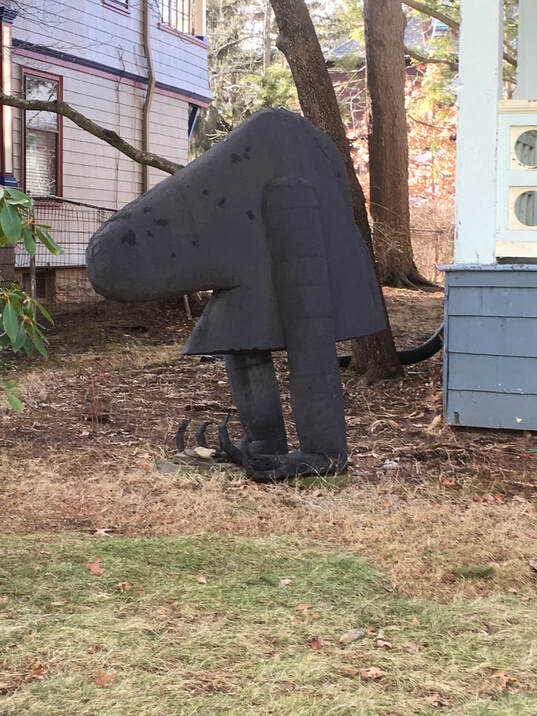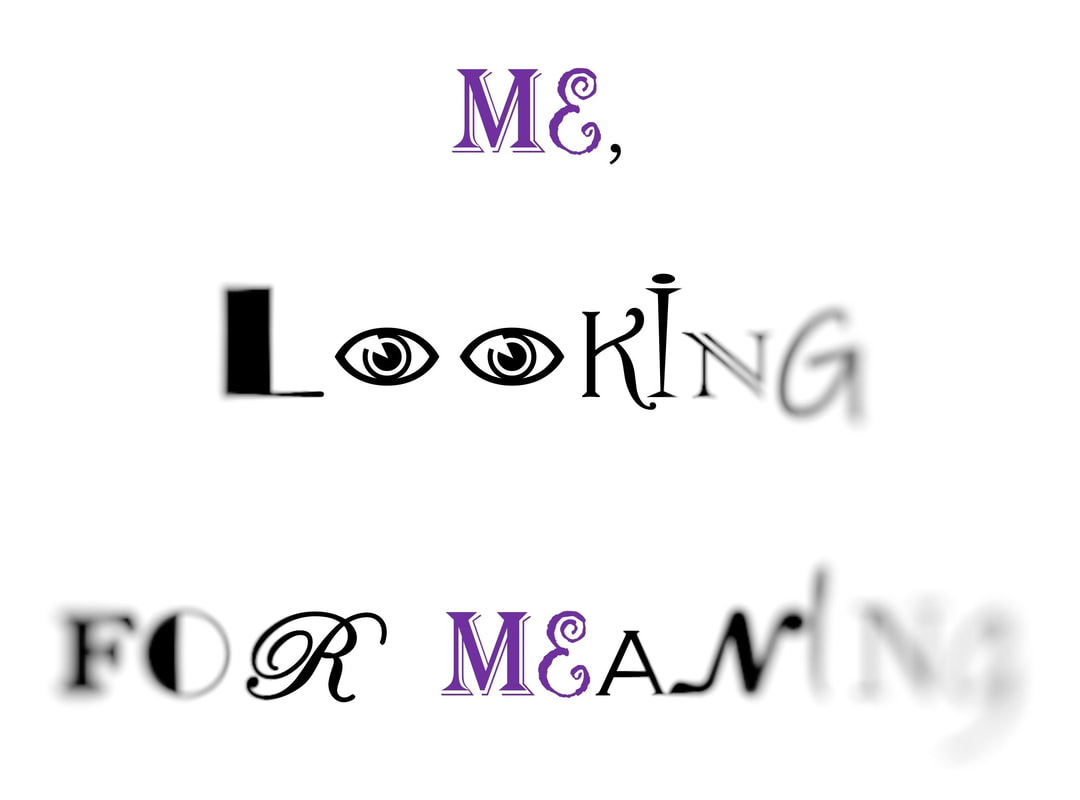Make Sense
PAGE IN PROGRESS
What you see here is a page of my hypertext book Me, Looking for Meaning. Initially empty, it will slowly be filled with thoughts, notes, and quotes. One day, I will use them to write a coherent entry, similar to these completed pages. See this post to better understand my creative process. Thank you for your interest and patience! :)
What you see here is a page of my hypertext book Me, Looking for Meaning. Initially empty, it will slowly be filled with thoughts, notes, and quotes. One day, I will use them to write a coherent entry, similar to these completed pages. See this post to better understand my creative process. Thank you for your interest and patience! :)

Take a look at this picture. Once you see it, you automatically try to understand it. This is how human brain works. Whatever our senses register needs to be interpreted according to our knowledge and previous experiences. It needs to be quickly categorized and explained in order for us to decide how to react. In other words, in needs to make sense.
You can trace this reaction back to our evolutionary journey. Even the simplest living beings constantly evaluate their environment in order to answer the question basic for their survival: "Approach or avoid?" Obviously, human beings are much more sophisticated than, say, amoebas. But the basic mechanism is the same: both us and amoebas need to constantly choose how to react to different aspects of the world.
Human brain is very smart, in a sense that it won't just wonder about the object our eyes see above. The brain will also (usually) know that this is a picture, so reacting to it needs to be different than reacting to the same object when encountered it in our own house (a scary thought - at least, for me). But the brain is not perfect, because it can be thrown off track by a variety of factors - both internal and external. By internal factors I mean a host of cognitive biases that affect the way we understand the world and live in it. Even understanding that something is a picture (or any other kind of representation) won't necessarily prevent us from experiencing the same emotions that a "real" thing would trigger.
When our senses perceive something, our brain asks: "What it is? What should I expect? What should I do?" We do not have to actually put these questions into words. Often, our reactions happen much faster than we could put all the sentences above together. On the other hand, in many other occasions we spend a lot of time trying to understand something. Whether our thinking is fast or slow, implicit or explicit, the end goal is the same: to
We can use the phrase "make sense" in two different ways.
1) Objects make sense to us.
2) We make sense of objects.
•We need meanings, we need things to make sense
•“It does not make sense” negative
Guy with tags on his hat in my neighborhood. I am trying to understand: what does it mean?
If an accident happens to me, I will try to make sense of it, although I will also be struggling with its perceived meaninglessness (since the accident will likely to trigger in me a host of negative emotions). Being able to emotionally recover overtime requires that I learn to make sense of what happened to me. Perhaps it was the act of god? Perhaps the universe was signaling something to me? Perhaps it was an opportunity for me to learn and grown, to get a second chance and change my life? If the answer to all these questions will be “no”, I may be miserable till the rest of my life.
"Approach or avoid" - basic meaning shared by all living beings, key for survival (see the source cited in "The Righteous Mind".
Making sense is important for our sanity, but it can lead to simplified explanations. Making sense can be healing because it constructs order out of chaos. For me, making sense means finding complexity. When I encounter an event, person, behavior that troubles me, I don’t makes sense of it in a rush in order to then dismiss quickly. I want to think about it deeply and understand it in a nuanced way (war in Ukraine, Jonny Depp defamation trial).
When a “bad thing” happens, making sense of it is part of our self-protection mechanism. The reason we will choose may be “it’s those assholes’ fault” or “it’s god’s will” or anything in-between.
Add image of the strange black sculpture (troll?) from Connecticut
Meanings are not embedded in objects. If you find an unknown object, you won't know what it is for. By trying to understand what it is, you are trying to get the perspective of people who created or used it.
Sacred object, object of worship (may not be sacred for another person)
Individual meanings: "wicked" musical, red cowboy boots, grandma's ring.
PAGE IN PROGRESS
About this project: Start page
You can trace this reaction back to our evolutionary journey. Even the simplest living beings constantly evaluate their environment in order to answer the question basic for their survival: "Approach or avoid?" Obviously, human beings are much more sophisticated than, say, amoebas. But the basic mechanism is the same: both us and amoebas need to constantly choose how to react to different aspects of the world.
Human brain is very smart, in a sense that it won't just wonder about the object our eyes see above. The brain will also (usually) know that this is a picture, so reacting to it needs to be different than reacting to the same object when encountered it in our own house (a scary thought - at least, for me). But the brain is not perfect, because it can be thrown off track by a variety of factors - both internal and external. By internal factors I mean a host of cognitive biases that affect the way we understand the world and live in it. Even understanding that something is a picture (or any other kind of representation) won't necessarily prevent us from experiencing the same emotions that a "real" thing would trigger.
When our senses perceive something, our brain asks: "What it is? What should I expect? What should I do?" We do not have to actually put these questions into words. Often, our reactions happen much faster than we could put all the sentences above together. On the other hand, in many other occasions we spend a lot of time trying to understand something. Whether our thinking is fast or slow, implicit or explicit, the end goal is the same: to
We can use the phrase "make sense" in two different ways.
1) Objects make sense to us.
2) We make sense of objects.
•We need meanings, we need things to make sense
•“It does not make sense” negative
Guy with tags on his hat in my neighborhood. I am trying to understand: what does it mean?
If an accident happens to me, I will try to make sense of it, although I will also be struggling with its perceived meaninglessness (since the accident will likely to trigger in me a host of negative emotions). Being able to emotionally recover overtime requires that I learn to make sense of what happened to me. Perhaps it was the act of god? Perhaps the universe was signaling something to me? Perhaps it was an opportunity for me to learn and grown, to get a second chance and change my life? If the answer to all these questions will be “no”, I may be miserable till the rest of my life.
"Approach or avoid" - basic meaning shared by all living beings, key for survival (see the source cited in "The Righteous Mind".
Making sense is important for our sanity, but it can lead to simplified explanations. Making sense can be healing because it constructs order out of chaos. For me, making sense means finding complexity. When I encounter an event, person, behavior that troubles me, I don’t makes sense of it in a rush in order to then dismiss quickly. I want to think about it deeply and understand it in a nuanced way (war in Ukraine, Jonny Depp defamation trial).
When a “bad thing” happens, making sense of it is part of our self-protection mechanism. The reason we will choose may be “it’s those assholes’ fault” or “it’s god’s will” or anything in-between.
Add image of the strange black sculpture (troll?) from Connecticut
Meanings are not embedded in objects. If you find an unknown object, you won't know what it is for. By trying to understand what it is, you are trying to get the perspective of people who created or used it.
Sacred object, object of worship (may not be sacred for another person)
Individual meanings: "wicked" musical, red cowboy boots, grandma's ring.
PAGE IN PROGRESS
About this project: Start page
